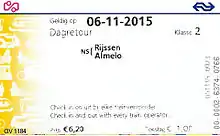Nederlandse Spoorwegen
Nederlandse Spoorwegen (NS; Dutch: [ˌneːdərlɑntsə ˈspoːrʋeːɣə(n)] (![]() listen); English: "Dutch Railways") is a Dutch state-owned company, the principal passenger railway operator in the Netherlands. Founded in 1938, NS provides rail services on the Dutch main rail network (Dutch: hoofdrailnet). The Dutch rail network is the busiest in the European Union, and third busiest in the world after Switzerland and Japan.[3]
listen); English: "Dutch Railways") is a Dutch state-owned company, the principal passenger railway operator in the Netherlands. Founded in 1938, NS provides rail services on the Dutch main rail network (Dutch: hoofdrailnet). The Dutch rail network is the busiest in the European Union, and third busiest in the world after Switzerland and Japan.[3]
 | |
| Type | State-owned naamloze vennootschap |
|---|---|
| Industry | Rail transport |
| Founded | 1938 |
| Headquarters | , Netherlands |
Key people | Marjan Rintel (CEO)[1] |
| Products | Rail transport, rail construction, services |
| Revenue | |
| Total assets | |
| Total equity | |
Number of employees |
|
| Parent | State of the Netherlands |
| Subsidiaries | Abellio Abellio Greater Anglia (60%) Abellio London Abellio ScotRail East Midlands Railway Merseyrail (50%) Nedkoleje NSRegio (99%) West Midlands Trains (70%) WestfalenBahn |
| Website | www.ns.nl |
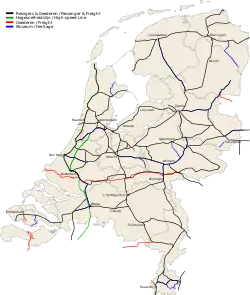 Railway tracks in the Netherlands | |
_-_Driebruggen-Hekendorp_(20607897939).jpg.webp) Double decker (DDZ) train near Gouda, South Holland | |
| Overview | |
|---|---|
| Locale | Netherlands |
| Dates of operation | 1938–present |
| Predecessor | Hollandsche IJzeren Spoorweg-Maatschappij (HSM) Maatschappij tot Exploitatie van Staatsspoorwegen (SS) |
| Technical | |
| Track gauge | 1,435 mm (4 ft 8 1⁄2 in) standard gauge |
The rail infrastructure is maintained by network manager ProRail, which was split off from NS in 2003. Freight services, formerly operated by NS Cargo, merged with DB Schenker in 2000. NS runs 4,800 scheduled domestic trains a day, serving 1.1 million passengers.[4] Also, NS provides international rail services from the Netherlands to other European destinations and carries out concessions on some foreign rail markets through its subsidiary Abellio.
History
Founding (1938)

Nederlandse Spoorwegen (NS) was founded in 1938 when the two largest Dutch railway companies, the Hollandsche IJzeren Spoorweg-Maatschappij (HSM) and the Maatschappij tot Exploitatie van Staatsspoorwegen (SS), formally merged. These two companies had already been intensively cooperating as early as 1917. There were both economic and ideological reasons for the cooperation.
As a result of World War I, the Dutch economy had declined causing HSM and SS to fall from profitability. Given their national importance, allowing them to slip into bankruptcy was not considered acceptable. While remaining independent companies, HSM and SS improved overall efficiency by cooperatively integrating their operations.
The Government of the Netherlands further supported HSM and SS by purchasing shares in both firms. In 1938, the authorities merged the two companies to form the Nederlandse Spoorwegen. In the process, the Government of the Netherlands bought all remaining shares, yet never nationalised the company. Therefore, Nederlandse Spoorwegen remained, and still is owned by the Dutch Government.
Early years as a state enterprise (1940s–1970s)
During World War II the NS remained an independent company, but was forced to do the Germans' bidding; NS was forced to construct the railway lines to camp Westerbork and help in the deportation of almost a hundred thousand Jews to extermination camps. The NS went on a strike once during the war, in the winter of 1944-45, after it had declined to participate in one a year earlier.
The NS played a pivotal role in the reconstruction of the country. There was little alternative transport in the country besides the train, while there was a huge demand for logistical services which the NS could provide. While the 1950s were a good time for the company, it started to decline in the 1960s, like most other railways around the world. Not only did the NS suffer from the competition of the car and other modes of transport, but it also suffered from a loss of income when natural gas started to replace coal as the main fuel in power stations and homes after a gas field was found near Slochteren. The NS had been involved in the transport of coal from the mines in Limburg to the remainder of the country.
The NS responded with an aggressive strategy named Spoorslag '70. This strategy meant, among other things, that the NS substantially increased the number of trains per hour and also introduced the Intercity services. However, it was quite clear that this would never return the company to profitability. Nevertheless, the company was declared to be of national importance, meaning that it would receive large amounts of subsidies every year.
Reforms period (1980s–2000s)
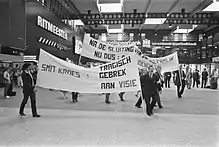
In the early 1990s, the Government of the Netherlands started to question the subsidies given to the NS. Not only were there questions regarding the way the NS spent the subsidies, but, after the neoliberal reforms of the 1980s, it was also considered not done to award generic subsidies to companies. The authorities decided on the verzelfstandiging (corporatisation) of the NS although technically, this is not the case, but instead refers here to withdrawal of the subsidies. The idea was that not only rail transport was economically viable, but that there could be competition as well.
There were two external circumstances which allowed for this to happen. Firstly, the European Union passed Directive 91/440, which prescribed, among other things, the formal separation of the national railways into two separate companies, one which deals with the infrastructure, and the other which deals with the transport activities. Secondly, the old CEO of the NS, Leo Ploeger, retired, which allowed the authorities to name a new CEO which would execute the government's plans. The new CEO was Rob den Besten. The plans entailed that the Government of the Netherlands would remain responsible for the rail infrastructure, while the NS would provide the passenger transport on a commercial basis. Where the services would prove to be economically inviable, the government would subsidise that route. The division which was responsible for the infrastructure would later be turned into NS Railinfratrust.
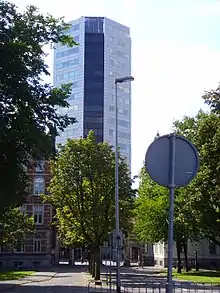
To facilitate government plans for the company's commercial operation, Den Besten planned to split the NS into many smaller independent divisions. The idea was that these smaller divisions would be better able to respond to the market. The plans, however, received massive opposition from the unions, which meant that the only divisions created were NS Reizigers, and locomotive maintenance company NedTrain. There were also other internal changes in the company. The route managers got de facto control over the operation, but they were dependent of a different organ in the company.
The freight sector NS Cargo became part of Deutsche Bahn after its merger with Railion in 2000 (later into DB Cargo).[5] These reforms were never much of a success and left the company in an uncontrollable state. The result was that the company started to decline rapidly, and that the employees started many unorganised strikes. Following this, the complete board of directors felt it necessary to resign in late 2001.
In 2002 Karel Noordzij was named as new CEO of the NS with the mission to restore the confidence in the company. In essence, he did this by reversing most of the reforms of the late 1990s and restoring the company to the old state. Meanwhile, the government had changed its opinion of the railways, it no longer considered competition on (passenger) transport a viable goal. Thus, the government started to commission railway operators to run routes on the network. The NS was granted (by the national government) the concession to run on the main lines, whereas other companies received a number of the concessions on the secondary lines. The goal is to give individual concessions for the individual lines, but (at least) until 2025 the NS holds the concessions for main lines.
Recent years (2010s)
The timetable change on 10 December 2006 saw the most routes to approximate the symmetry time in clock-face schedules to the one used in most other European countries. Previously, this was different at minute (46 seconds) and led to problems by cross-border trains. In August 2015, former Minister of the Interior and Kingdom Relations Roger van Boxtel was named CEO of Nederlandse Spoorwegen.
Controversies
NS has been involved in various controversies.
- Technical problems with the high-speed V250 trains, which started its services on 29 July 2012, and ended on 17 January 2013, led to the resignation of CEO Bert Meerstadt in June 2013[6] and to a parliamentary investigation in 2015. The High Speed Alliance (HSA), a NS (90%) / KLM (10%) joint venture almost went broke due to the late introduction of the trains in combination with a too high price for the concession which the company paid to the Dutch government. HSA was liquidated in 2015.
- In 2013, it was revealed that NS had been using a subsidiary in Ireland, NS Financial Services Company (NSFSC), to reduce its tax liability in the Netherlands. The procedure was determined to be lawful, but it was unfavorable for the Dutch taxpayers for a state-owned company to avoid national taxes. From 1998 the NS used the favourable tax climate in Ireland, which resulted in a profit to NS of more than €270 million but a loss to the Dutch state of €21 million in 2012 alone.[7] The corporate tax rate in Ireland was 12.5%, in the Netherlands 25% at that time.[8] NS used its Irish subsidiary to buy new trains, among others the high-speed V250 trains from the Italian firm Ansaldo Breda. The Dutch Minister of Finance, Jeroen Dijsselbloem, wrote to the parliament that NS would stop this tax evasion. Most rolling stock was transferred to the Netherlands-based NS Lease in December 2017.[9] NSFSC was wound up in April 2019.[10]
- In 2015 it became clear that a subsidiary of NS, Abellio, had shown unfair behaviour with regard to a tendering for public transport in the province of Limburg. The company had obtained confidential information from a competitor, Veolia, through a former employee of Veolia who had been hired by Abellio subsidiary Qbuzz.[11] On 5 June 2015, it became clear that CEO Timo Huges of the NS had given incomplete and incorrect information about the tendering procedure. According to Minister Dijsselbloem, Huges had acted "sloppy, inaccurate and in violation of the law."[12] Consequently, Huges resigned from his position.[13]
Coverage
The NS covers most of the country, with almost all cities connected, mostly with a service frequency of two trains an hour or more and at least four trains per hour between all of the largest five cities (Amsterdam, Rotterdam, The Hague, Utrecht and Eindhoven) as well as some smaller cities (Nijmegen, Amersfoort, Arnhem, 's-Hertogenbosch, Dordrecht and Leiden). From December 2008 train frequencies were increased on following services: Arnhem–Nijmegen (8 trains per hour) and The Hague–Rotterdam (12 trains per hour), Amsterdam Centraal–Hoofddorp (16 trains per hour). A night train service was added between Utrecht, Gouda and Rotterdam.[14] Trains usually run between 5:00 a.m. and 1:00 a.m. although there is also a night line which connects major cities in the Randstad throughout the night, as well as in weekends also some major cities in North Brabant.
In addition to its domestic services, NS is also a partner (along with Stena Line and its British railway company Abellio Greater Anglia) in the Dutchflyer service. NS has also entered into a partnership with KLM to operate services on the new HSL-Zuid under the name Intercity Direct towards Breda and Brussels. Intercity Direct is part of NS International; other services such as Thalys to France and Intercity-Express to Germany and Switzerland are also part of NS International.
Rail network
.jpg.webp)
The hoofdrailnet is the official core internal passenger railnetwork of the Netherlands. Currently NS has a concession until 1 January 2015 to provide all passenger services on this network, except that on some stretches there is an overlap with lines for which other operators have a concession. Some of the most notable of these stretches are those from Elst railway station to Arnhem Centraal railway station, where NS shares tracks with Arriva, and further on to Arnhem Velperpoort. Here the tracks are shared by three operators, as Breng, ultimately part of Transdev, operates there in addition to the two previously mentioned operators. Officially the overlaps do not constitute competition on the same lines.
The concession was free of charge until 2009, and costs an increasing amount since then, up to €30 million for the year 2014. The concession distinguishes main stations and other stations. Except on New Year's Eve, the main stations have to be served at least twice an hour per direction from 6 a.m. to midnight and the other stations at least once an hour. Exceptions are possible until the start of the next concession.[15]
The next concession period is 2025–2035. For the 2015–2025 concession, requirements include: for every train service where on average more than one-third of the passengers travel longer than 30 minutes, a train with a toilet is used, every newly ordered train has a toilet and in 2025 every train has to have a toilet. Currently trains on the hoofdrailnet without a toilet include the NS SGMm numbers 2111 to 2125, the so-called classical "Sprinter" and the Sprinter Lighttrain (SLT, these trains are being converted periodically to have a toilet on board).
Types of train service
NS provides three kinds of train service:
- A Sprinter stops at all stations, and is mainly used for local traffic. On some smaller lines, though, it is the only kind of service. The name is derived from the 'Sprinter' (2900 class) rolling stock; however, the service was sometimes operated using older style rolling stock (such as 'Plan V/T': 400, 500, 800 and 900 class).
- Intercity services only stop at larger stations, and were introduced in the 1970s to provide fast train connections throughout the country. Intercity services are operated by DDZ, VIRM and ICM class trains. An exception is the service between Den Haag Centraal and Eindhoven, which makes use of the high-speed line between Rotterdam and Breda, and requires Bombardier Traxx-hauled carriages. When a line is not served by Sprinters, Intercity trains stop at all stations. This takes place on the lines between Alkmaar - Den Helder, Bergen op Zoom - Vlissingen, Hoorn - Enkhuizen, Leiden - Woerden, and Deurne - Venlo. See also Intercity services in the Netherlands and List of Dutch Intercity stations (in Dutch).
- The Intercity Direct service, which offers faster service between Amsterdam Centraal and Breda as it makes use of the high-speed line HSL-Zuid and calls at only two intermediate stations (Schiphol Airport and Rotterdam Centraal). Unlike other Intercity trains, the Intercity Direct requires payment of a supplement on top of the regular fare (€2.60 if bought online and swiping on the platform during peak hours and €1,56 when swiping during off-peak hours) if a passenger's journey involves the high-speed line between Schiphol Airport and Rotterdam Centraal. A regular Intercity service that is free of supplements is still offered.
There are also two former train categories, which are now used only by private operators:
- Stoptrein: This is the original name for Sprinter trains. Between 2003 and 2013 NS discharged the Stoptrein formula in favour of Sprinter. Private operators do not use Sprinter so all private services in the Netherlands (except of the four Sneltreins of Arriva, see below) are Stoptrein.
- Sneltrein: Sneltrein (in the English section of the old paper time tables, they were translated as "semi fast train" and were a class between Stoptrain and Intercity) was abandoned by NS in 2008. The NS Sneltrein services are now called Intercity, but they stop more often than "real" Intercities. The result is that some stations (like Woerden) are served by some Intercities while others pass it. As of 2015, there are four Sneltrein services by Arriva.
Fares and tickets
The OV-chipkaart is the common form of fare payment. Single or return tickets, used by incidental travellers and tourists, are available at ticket machines and service counters at a surcharge of €1. They are a disposable use-once only. It is possible to buy e-tickets online on the Dutch Railways website. E-tickets can also be purchased on the Belgian NMBS/SNCB B-Europe website. For long term use season tickets are available.[16]
Travelling with these cards and tickets, one has to register starting a journey (check in) and ending it (check out) at the destination. One always has to travel away from the point of one's latest check-in. Thus, in the case of a voluntary detour, one has to check out and check in to register starting a new journey.
Travellers need to be aware of the various companies other than the Nederlandse Spoorwegen. One needs to check out with one company and check in with another on some stations. There is common tariff system with four smaller passenger train operating companies: Keolis Nederland and Connexxion in the centre and the east, Veolia on the 'Maaslijn' and 'Heuvellandlijn' in the south east, Arriva in the north and most of the east of the country and on the 'Merwede-Lingelijn' (from Dordrecht to Geldermalsen).
The OV-chipkaart is also used on buses and trams, where hourly tickets are for sale for those who have too little credit to travel but enough cash.[17]
Off-peak discount passes
NS defines off-peak hours as weekdays 09:00-16:00 and 18:30-06:30, and on Saturdays and Sundays the whole day. Therefore, full fare is required on weekdays 06:30-09:00 and 16:00-18:30. With an OV-chipkaart that allows for a discount or free travel one is automatically granted the discount or free travel at the time of checking in. There is a number of season tickets available that suit individual preferences.[18]
Logo
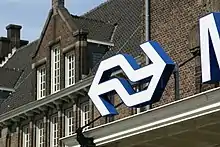
The NS corporate logo was designed in 1968 by Gert Dumbar and Gert-Jan Leuvelink both of the graphic design company Tel Design. Introduced in that same year, it replaced an earlier design which had been used since 1946. The logo, pervasive within trains and railway stations in the Netherlands, plays a significant part in Nederlandse Spoorwegen's signage, promotions, advertising and graphic design.
The logo usually appears in blue or black on a dark yellow or white background. Since its introduction, NS livery has also had this same distinct dark yellow or white colour. The logo is a widened letter 'N' and a sideways (reversed) 'S'-shape. The two arrows in the logo represent the train's movement, and the two lines in the middle represent the track.
Divisions of NS
.JPG.webp)
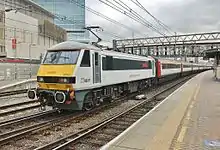
.jpg.webp)
- Abellio is the subsidiary for operations outside the Netherlands. Abellio has won several franchises in the United Kingdom and Germany.
- In 2003, Abellio commenced operating its first rail franchise in the United Kingdom, through its 50% shareholding in Serco-Abellio.[19] From 2004 until 2016, Serco-Abellio also operated the Northern Rail franchise.[20] In May 2009, the Travel London and Travel Surrey bus businesses were purchased from National Express and rebranded as Abellio London and Abellio Surrey.[21][22]
- In February 2012, Abellio Greater Anglia commenced operating the Greater Anglia franchise,[23] and in April 2015, Abellio ScotRail commenced operating the ScotRail franchise.[24][25][26] In 2016, Abellio successfully bid to retain the renamed East Anglia franchise until 2025.[27] Abellio has partnered with Mitsui for both the East Anglia and the West Midlands franchises, the latter also with JR East. In June 2019 Abellio began operating the East Midlands Railway eight-year franchise.[28]
- NS Reizigers (NSR) - NS Travellers, responsible for passenger train services and for employing train drivers and conductors.
- NS Stations - the result of merging the former :
- NS Stations - in charge of the operation of all 404 railway stations in the Netherlands, i.e., also those served by other railway companies than NS Reizigers; see also station facilities.
- NS Vastgoed - owns 48 km2 of land, often near stations, and develops and operates these areas as public traffic nodes, offices and apartments.
- NedTrain - train maintenance.
- NS Commercie - product- and customer management (business and product development, marketing, sales and customer service).
- NS International - operator, in conjunction with NS Reizigers and foreign partners, of high-speed international Fyra services on the HSL-Zuid, Thalys (from Amsterdam to Paris), ICE (to the German Ruhr area), Intercities (to Berlin and Brussels) and the Swiss CityNightLine (to Munich and Zurich).
In dealing with the general public, these distinctions are not made and the terms Nederlandse Spoorwegen and NS are used.
NS has contracts with Connexxion and BBA, now Veolia Transport for the provision of bus services to replace train services in the case of planned and unplanned cancellations.
On 23 July 2010 NS sold Strukton to the construction company Oranjewoud N.V.. This concluded a long history of planning, designing and executing track development done by the NS.[29][30]
Policy
There is a delay refund scheme entitling passengers to a partial or full refund of the ticket price if a journey is delayed by half an hour or more. The scheme does not apply on short-distance journeys (tickets less than €2.30) and cases in which the delay is the result of planned cancellations that were announced some days in advance. Refunds are, in general, half the ticket price of a one-way trip after a delay of over 30 minutes, the full ticket price after a delay of one hour or more. That applies to nearly all kinds of tickets. The refund is not considered a monetary compensation for lost time but rather as a reduction in charges where a poor service has been provided. The system has improved for holders of some rail passes. Part of the cost of the scheme is paid by ProRail, since they are responsible for part of the delays.
Since 1 January 2004, tobacco smoking is prohibited on domestic trains, station halls and covered parts of platforms. The smoking of cannabis was already prohibited. Smoking is allowed near smoking-zones (Rookzones), posts with an ash-tray built in, scattered around stations.
Since June 2003, the sale of coffee, soft drinks, beer, sandwiches, candy, etc., has ceased aboard domestic trains. The increasing number of Servex convenience stores at railway stations and the relatively short duration of most train journeys in the Netherlands have lowered the demand for on-train services. In 2005, a much reduced in-train service of drinks and small snacks has been reintroduced on longer journeys. Now, the RailTender service primarily operates in the intercity trains on the trajectory between Utrecht and Zwolle/Eindhoven, Zwolle and Almere, 's-Hertogenbosch and Nijmegen, Apeldoorn and Amersfoort, Rotterdam and Breda/Roosendaal/Antwerp
Technological assistance for train staff
Conductors have a smartphone with timetable, fares information, and a separate cardreader to read the OV-chipkaart.
Statistics
- 14.73 billion passenger km per year (2005), which is 30% of the seat km.
In 2018, NS saw its number of passengers increase by nearly 3 percent. On average, 1.3 million people took the train on a weekday, 100.000 more than in 2016 and the over 250 NS train stations are becoming increasingly crowded.
The top 10 busiest train stations in the Netherlands by travelers per working day in 2018:
- Utrecht Centraal - 194,385
- Amsterdam Centraal - 192,178
- Rotterdam Centraal - 96,690
- Schiphol Airport - 92,214
- Den Haag Centraal - 91,437
- Leiden Centraal - 79,376
- Eindhoven - 65,468
- Amsterdam Zuid - 60,819
- Amsterdam Sloterdijk - 58,800
- ‘s Hertogenbosch - 47,347
Also see List of busiest railway stations in The Netherlands
See also
References
- "Marjan Rintel benoemd tot nieuwe president-directeur NS". NS. Retrieved 23 June 2020.
- "NS Annual Report 2018" (PDF).
- , International Union of Railways Annual Report, 2015.
- "Annual report 2010". Nederlandse Spoorwegen. 1 January 2011. Archived from the original on 30 June 2011. Retrieved 18 July 2011.
- DB and NS sign freight merger Railway Gazette International 1 August 1999
- "NS-topman Bert Meerstadt stapt op". Archived from the original on 25 June 2015. Retrieved 5 June 2015.
- "NS stopt met fiscale truc: treinen niet langer gekocht door Ierse dochter". Retrieved 5 June 2015.
- "NS doet nog steeds zaken via de Ierse route". NRC Q. Retrieved 5 June 2015.
- NS repatriates train leasing Railway Gazette International 26 February 2018
- NS ends Irish-registered leasing activities Railway Gazette International 29 April 2019
- "Limburg gunt concessie openbaar vervoer aan Arriva". Retrieved 5 June 2015.
- "Nog meer problemen voor ex-NS-topman Timo Huges". Retrieved 19 June 2015.
- "'NS-topman Timo Huges stapt op wegens mogelijk machtsmisbruik'". Retrieved 5 June 2015.
- www.treinreiziger.nl Archived 11 December 2008 at the Wayback Machine
- "Nieuws". ns.nl. Retrieved 23 September 2016.
- Find the season ticket that suits you
- "OV-chipkaart (for tourists)". Trans Link Systems B.V. Retrieved 21 April 2018.
- All 7 season tickets (that allow for discounts)
- Dutch and Serco win Merseyrail franchise The Railway Magazine issue 1226 June 2003 page 6
- Serco and NedRailways joint bid secures new Northern franchise Rail Express issue 99 August 2004 page 5
- National Express Group plc agreement to sell Travel London Archived 2 February 2014 at the Wayback Machine National Express Group 21 May 2009
- NedRailways acquisition reinforces long term commitment to UK transport market Archived 18 January 2016 at the Wayback Machine NedRailways 9 June 2009
- Greater Anglia rail franchise announcement Department for Transport 20 October 2011
- Dutch firms wins ScotRail franchise from FirstGroup BBC News 8 October 2014
- Abellio awarded ScotRail franchise Railway Gazette International 8 October 2014
- Abellio awarded contract to operate Scotland's National Railway, ScotRail Abellio
- Better journeys for rail passengers and boost for Derby train industry as new East Anglia franchise announced Department for Transport 10 August 2016
- Dutch firm Abellio takes over East Midlands rail franchise BBC News 18 August 2019
- "NS agrees to sell Strukton". Railway Gazette International. 29 July 2010. Retrieved 24 March 2012.
- Oranjewoud N.V., the holding company that owns Strukton.
- DUTCH RAILWAY HANDLES 1.3 MILLION TRAVELERS PER WORKING DAY
Further reading
External links
 Media related to Nederlandse Spoorwegen at Wikimedia Commons
Media related to Nederlandse Spoorwegen at Wikimedia Commons- Nederlandse Spoorwegen, English website
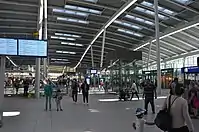
%252C_Centraal_Station_--_2015_--_7269.jpg.webp)
.jpg.webp)
